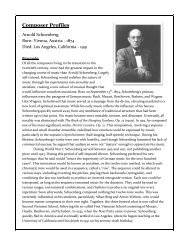Composer Profiles - Andrew Lesser Music
Composer Profiles - Andrew Lesser Music
Composer Profiles - Andrew Lesser Music
- No tags were found...
You also want an ePaper? Increase the reach of your titles
YUMPU automatically turns print PDFs into web optimized ePapers that Google loves.
<strong>Composer</strong> <strong>Profiles</strong>Hector BerliozBorn: La Côte-Saint-André, France - 1803Died: Paris, France - 1869BiographyBorn in a small village in the shadow of the FrenchAlps, Hector Berlioz was never supposed to embark upona musical career. His father, Louis, was a physician andexpected young Hector to follow in his footsteps. Hector,however, had no intentions of a medical career. It is citedin his Memoirs that upon seeing a medical corpse he “leaped out of the window and fled home asthough Death and all his hideous crew were at my heels”. 1 Though his father continually pressedhim to return to medical school, Berlioz was far more interested in visiting the library of the ParisConservatory, studying the works of Beethoven and Gluck. In 1826, he finally dropped medicineand enrolled at the Conservatory, studying composition with Jean-François Lesueur and AntonReicha. On his fourth attempt, Berlioz won the prestigious Prix de Rome with his cantata LaDerniére Nuit de Sardanapale. In 1827, three years prior, he had met the Irish actress and singerHarriet Smithson while she was touring in a Shakespeare theatre company. Berlioz immediatelybecame enraptured and obsessed with Smithson, flooding her hotel room with letters and flowers.It was Smithson that Berlioz had in mind when composing his orchestral masterwork, theSymphonie Fantastique. Smithson and Berlioz would marry in 1833, but their individualpersonalities, mood swings, and violent tempers would considerably strain their marriage.During the years 1830-1840, Berlioz experienced a surge of creativity. It was during theseyears that he would write his second symphony, Harold in Italy (1830), the Requiem Grand Messedes Morts (1837), and his dramatic symphony Romeo et Juliette (1839). He spent much of his midto later years writing literary criticisms and the influential Treatise on Instrumentation (1844), inaddition to conducting his own works. In 1850 he became head librarian of the ParisConservatory, the only official post he would ever have. Though considered one of France’s mostesteemed composers, Berlioz felt lonely and detached even from his friends, who included FranzLiszt and Fréderic Chopin. The death of his son, Louis, in 1867 combined with intestinal illnessesput him into a deep depression. Hector Berlioz died in his Paris estate on March 8 th , 1869. His lastwords were reputed to have been “At last, they are going to play my music”. 2WorksInfluenced primarily by the music of Beethoven and the writings of Shakespeare, Berliozinfused innovative orchestral techniques with literary and poetical references, creating music that1 Cairns, David, ed. The Memoirs of Hector Berlioz. Alfred A. Knoft: New York, 1969.2 Ibid.
would become the standard of French Romanticism. His contemporaries included Liszt andChopin, but while his two friends were piano virtuosos, Berlioz never received more than a basiceducation on any instrument. He is one of the first successful composers who did not give publicperformances on an instrument, nor was he considered gifted by any means outside conductingand composition. Berlioz’s genius lies in his original and imaginative compositional style. Hardlyany of his works lack a programmatic title or some kind of story progression. One of his mostfamous works for orchestra, the Symphonie Fantastique, Op. 14, is a series of “episodes in the lifeof the artist”, and includes five separate “scenes”, including a ball, a scene in the country, and evena scene where the artist himself suffers an execution at the guillotine. Each movement of thesymphony features an idée fixe, or “fixed idea” which serves as a unifying theme throughout thework. This concept would eventually inspire the Wagnerian leitmotif. The Symphonie wasfollowed by similar works such as Harold in Italy, Op. 16, which was commissioned by no less thanPaganini, and the “dramatic symphony” Romeo et Juliette, Op. 17. In his works, Berlioz uses veryspecific instrumental combinations to draw out the heightened emotional qualities of hopelesslove, a concept that highly characterized the Romantic movement. Before Berlioz, orchestrationswere written primarily in the Classic style, with the strings performing the main melodic materialand the winds and brass serving as accompaniment. Berlioz’s unique treatment of the orchestrabecame the inspiration to European composers such as Wagner, Debussy, and Richard Strauss,who would later edit Berlioz’s Treatise on Instrumentation, now considered a seminal work onorchestration.Berlioz’s operas were no less programmatic, although they were not nearly as successful ashis concert orchestral works. Berlioz saw his operas more as dramatic scenes with commonthemes; they are more like individual episodes united by a single plot. Unfortunately, his operaswould not take hold in the repertoire; the composer Charles Gounod wrote of Les Troyens that“he [Berlioz] died beneath the walls of Troy”. 3 Berlioz’s best known vocal composition is the GrandMesse des Morts, Op. 5, a Requiem of gigantic proportions. It is approximately 90 minutes inlength and consists of ten separate movements. According to Berlioz’s program notes, the numberof performers including the chorus could possibly exceed one thousand, with four separate brassbands and choruses placed throughout the hall. This was also considered Berlioz’s favorite piece,he is quoted that “if I were threatened with the destruction with the whole of my works save one,I should crave mercy for the Messe de Morts”. 4 Works such as these established Berlioz as one ofthe century’s premiere composer of dramatic music, and symbolized the ideals of the Romanticperiod.Suggested ListeningSymphonies: Symphonie Fantastique, Op. 14; Harold in Italy, Op. 16; Romeo et Juliette, Op. 17Opera: Benvenuto Cellini, Op. 23; Les Troyens, Op. 29; La Damnation de Faust, Op. 24Overtures: Le Corsaire Overture, Op. 21; Roman Carnival Overture, Op. 9Mass: Grande Messe des Morts, Op. 5 (Requiem)3 Ibid.4 Ibid.










